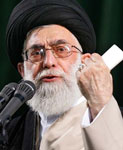 USA Today: In conflicts with religious law, “the expediency of the regime” rules, according to official Iranian government policy. Iran says its supreme leader’s letters and speeches denouncing nuclear weapons count as religious edicts, or fatwas.
USA Today: In conflicts with religious law, “the expediency of the regime” rules, according to official Iranian government policy. Iran says its supreme leader’s letters and speeches denouncing nuclear weapons count as religious edicts, or fatwas.
USA TODAY
By Oren Dorell
 In conflicts with religious law, “the expediency of the regime” rules, according to official Iranian government policy.
In conflicts with religious law, “the expediency of the regime” rules, according to official Iranian government policy.
Iran says its supreme leader’s letters and speeches denouncing nuclear weapons count as religious edicts, or fatwas, prohibiting their use and stockpiles and backing up a claim of the White House.
But a Washington-based research group says the statements are not fatwas but merely political posturing, which does not carry the weight of a religious proclamation.
The alleged fatwa has taken on significance because President Obama referred to it last week as a basis for believing that Iran may be sincere when it said it wishes to negotiate in good faith over its nuclear program. Obama was countering the claims of critics who say Iran’s offer was just a stalling tactic to give it time to develop an atomic bomb.
When asked last week, the White House did not produce evidence for the existence of the fatwa. Alireza Miryousefi, chief spokesman for Iran’s mission to the United Nations, provided to USA TODAY an April 2010 letter to the International Conference on Nuclear Disarmament that he said shows that Iran’s supreme leader, Ali Khamenei, did issue a fatwa against nuclear weapons.
In the letter, Khamenei said: “We consider the use of such weapons as haram (religiously forbidden) and believe that it is everyone’s duty to make efforts to secure humanity against this great disaster.”
Miryousefi says the letter counts as a fatwa, or “a religious verdict by a religious leader which must be followed by all his followers.”
Such a verdict can be issued in multiple ways, including “a declaration, statement, lecture, letter and any kind of indications that reflects the religious leader’s views on a specific issue,” Miryousefi said.
But Yigal Carmon, president of the Middle East Media Research Institute and a former chief counterterrorism adviser to two Israeli prime ministers, says Iran is trying to fool the Americans.
“They want to win all the respect of a religious document while in reality giving a political statement only,” Carmon said.
Miryousefi also provided a 2006 speech by Khamenei as evidence of his fatwa against nuclear weapons. In it, Khamenei denied Iran is developing nuclear weapons, saying “any benefit would not be worth the cost,” according to a translation from Farsi. The reason he cites, however, is not religious or God’s law, but international pressure.
Carmon said Khamenei’s statements against nuclear weapons are not listed on Khamenei’s official fatwa site, which lists hundreds of fatwas. And in 2012 Khamenei declined to answer a request for a religious ruling posted to his Facebook page about whether it is allowed to obtain nuclear weapons (as opposed to use them), he said.
“Why can it be on all other sites and only on the site that it belongs to — since it is a fatwa — it does not exist?” He wrote in an e-mail.
The speech “is an explanation, not a religious verdict prohibiting it.”
Mehdi Khalaji, an analyst at the Washington Institute for Near East Policy who studied at the Shiite seminaries in Qoms, says all of Khamenei’s statements — written or verbal — do count as fatwas. But that in no way means Iran cannot develop the technology for nuclear arms, or even use them, he said.
“There is no doubt that Khamenei made this fatwa several times in speaking and oral statements,” Khalaji said. “What Khamenei says is about an actual bomb. Producing stockpiling or using an actual bomb is forbidden in Islam. But he doesn’t say anything about nuclear capability, which is a matter of concern for the international community.”
And besides, Khalaji said, political decisions in Iran are not based on fatwas, but rather on national interest.
The official policy set by Iran’s first supreme leader, the Ayatollah Ruhollah Khomeini, gives “the expediency of the regime” primacy in conflicts with religious law, Khalaji said. Iran’s religion-based constitution states that education should be free, but for practical reasons the regime charges for college-level education, he said.
“So fatwa is not the basis for decision-making,” he said. “It’s regarded as far as it’s not in conflict with the Islamic republic.”
When it comes to nuclear weapons, especially to ensure regime survival, “There is no religious or legal constraint on policy making in Iran,” he said. “If Iran decides to make a bomb there would be no religious constraint.”
And religious rulings are impermanent, Khalaji says. “Fatwas can change overnight.”


